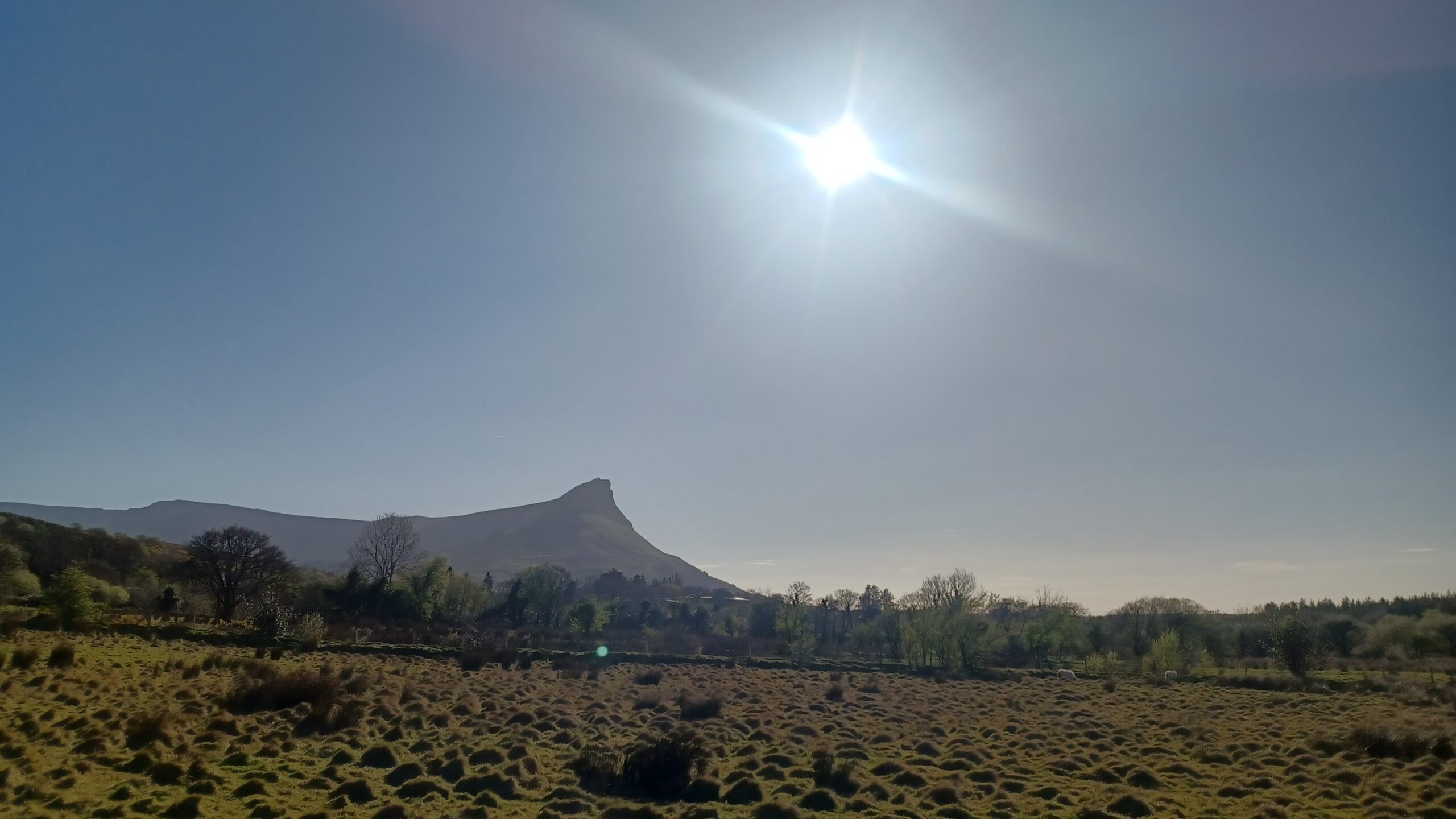
It’s been almost six months since I’ve been welcomed onto the JCFJ team, so I thought I would report on some of the highlights in what has been an intense time of learning, reflection, challenge, and connection.
As well as helping the team with environment-related submissions, assisting with our publication Working Notes, and promoting my colleagues’ excellent and practical book The Parish as Oasis, I’ve also attended many meetings, conferences, training events and other opportunities to learn and reflect, beginning with the Seeds of Hope conference in Cork in January. These gatherings have been a chance to connect with people who are working in various ways for a fairer society and healthier planet.
One event I will never forget is the Climate Justice Fundamentals: An Introduction to Colonialism and Extractivism training weekend in Sligo in early April. Organised by Friends of the Earth, the course brought together a diverse group of people to learn about climate justice together, guided by two skilled facilitators. The three days were packed full of useful activities and discussions, the most memorable being a screening of ‘La Buena Vida’ (The Good Life), a 2015 documentary by director Jens Schanze. The film tells the story of the Wayúu community in northern Columbia whose centuries-old way of life in the forest is being destroyed by the expansion of the vast El Cerrejón mine, which exports coal to fuel the fast-paced lives of people in the global North. It was a stark illustration of how colonialism and extractivism are not outdated nineteenth century concepts but ongoing and relentless drivers of inequality and destruction today.
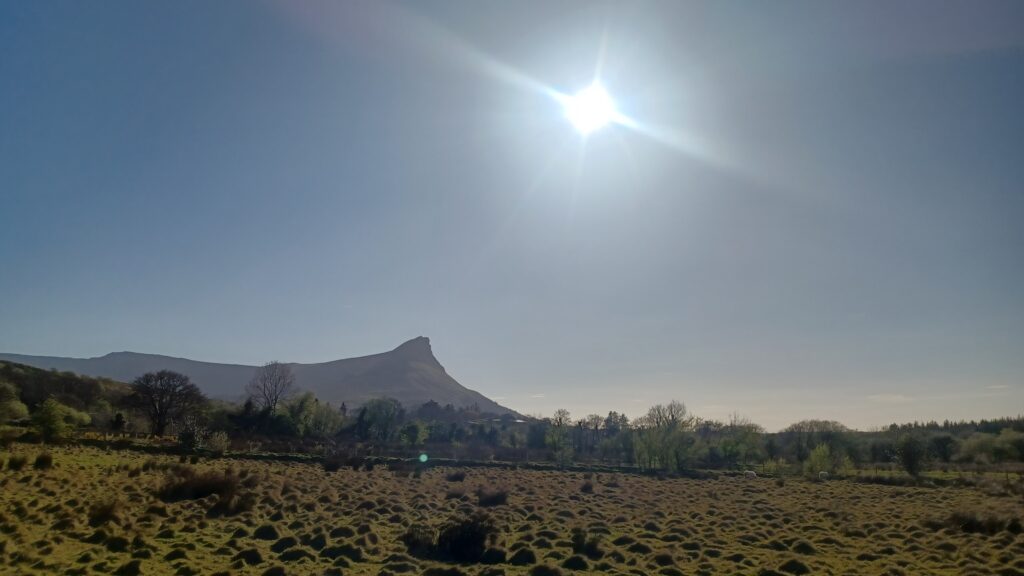
Photo caption: on a walk in the vicinity of the Benwisken Centre, Sligo. Chances to walk and reflect during the training weekend were an integral element of the programme.
Participants in the Climate Justice course were invited to bring along a book that has inspired them, and I chose The Lost Spells by Robert Macfarlane and Jackie Morris. It is a collection of poems and artwork and part of a project that began as a response to the removal of a host of nature words from a widely-read children’s dictionary. The project inspires me because it uses art to inspire connection or reconnection with nature, and it also helps us to reflect on what is lost when we don’t know the words for the animal or plant species with which we share our world.
I was very pleased, then, when Macfarlane and Morris’s work was featured by Rev. Dr Hannah Malcolm in the JCFJ annual lecture, which took place a couple of days after the Sligo course. Entitled ‘Who is a Good Local? The Theology of Naming’, it was an insightful discussion of how naming can be an act of attentiveness, hospitality, and praise. Naming can also foster a sense of belonging at a time when many people feel displaced. The lecture contained a wealth of ideas and you can listen to a recording of it here.
Later in April I attended the annual conference of the DCU Institute for Climate and Society which this year had the theme ‘Dispatches from a changing climate’. Panels discussed defending environmental human rights at home and abroad; the arts and the environment; climate science, art and activism; and reporting from the climate front lines. The keynote speaker was UN Special Rapporteur on Human Rights Defenders, Mary Lawlor. Every single speaker was engaging and inspiring in their own way, but two highlights for me were writer Kerri ní Dochartaigh, who talked about the three T’s of art – Truth, Trust, and Tenderness – and Fidelma O’Kane of the Save Our Sperrins campaign, who shared her very helpful campaigning tips.
Despite all the devastating reminders of how climate change is disproportionately affecting already marginalised and vulnerable communities, and of how environmental rights defenders are persecuted all over the world, the overall tone of the gathering was creative, constructive, and hopeful. I, for one, came away re-energised and reassured by all the people who are working hard to protect our planet and its inhabitants in whatever way they can.
Another highlight of my time in the JCFJ has been the chance to join my colleagues on two walking tours of the North East Inner City led by Richard Carson from ACET. In the ‘Race and Place’ tour we learned about Dublin’s long history as a multicultural and multifaith city, and in ‘The Fire Next Time’ Richard explored church-state relations by talking about four fires that occured in the Marlborough Street area over the past couple of centuries. Not only did these tours help us learn more about the past and present of the area where we work, they also helped me reflect more on how colonialism shaped and still shapes how decisions are made and resources are allocated in our country today.
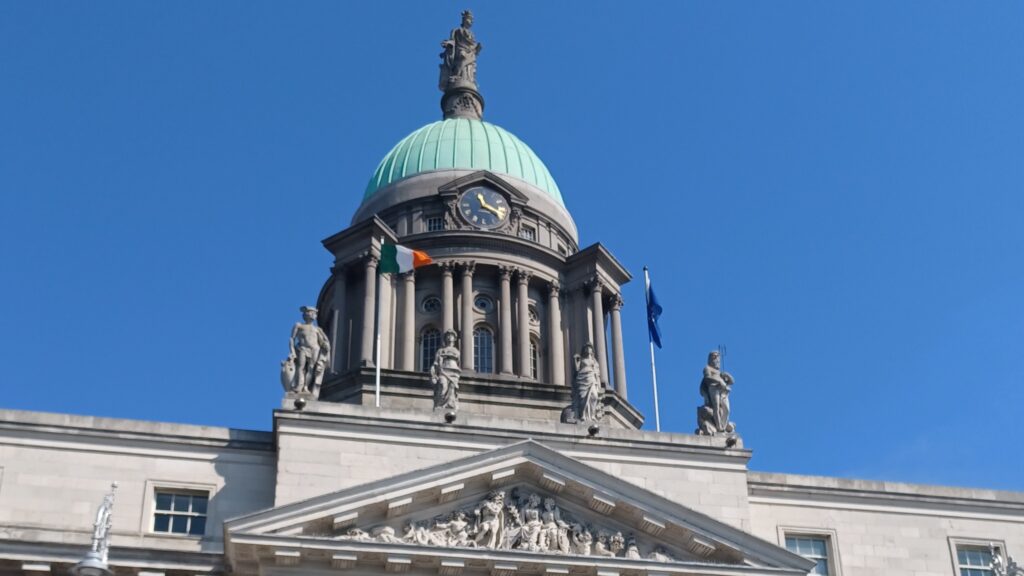
Photo caption: The starting point of the ‘Race and Place’ tour. The south pediment of the Custom House features a sculpture depicting ‘The Friendly Union of Great Britain and Ireland with Neptune driving away Famine and Despair’.
On a Saturday in May I joined another walking tour, this one organised by Friends of the Earth as part of their data centres campaign. The first thing that struck me at this event was the number of people who turned up to take part. On a sunny weekend day, when they could have been enjoying the weather in one of Dublin’s parks or beaches, they had instead chosen to find out how the data centre industry has expanded in Ireland, and what the implications of this are for energy, water, cost of living, and climate targets. The tour was very informative, with stops at significant locations such as the ESB and Fine Gael headquarters, the Department of Climate, Energy, and the Environment, and the River Dodder in Ringsend. As well as the expertly-delivered input we got at each spot by the tour leaders, another valuable aspect of the event was the chance to chat with other participants as we walked between spots. While reconnecting with people I had previously met while volunteering, I was reminded of how everything is connected. Whether you choose to campaign for active mobility infrastructure, or to reducing food waste, all of this action is interconnected and has the shared aim of improving life for current and future generations.
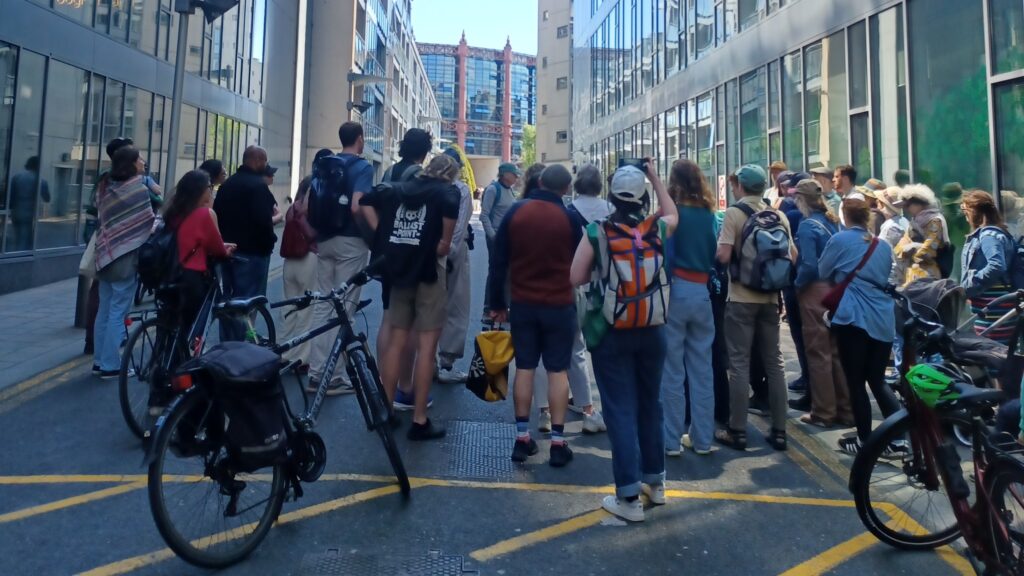
Photo caption: Learning about data centres in Dublin’s Docklands, home to several multinational tech companies.
These are just some of the memorable learning opportunities I’ve had over the past few months. I could also mention a lively and inspiring lunchtime gathering with Martha Phiri from the Jesuit Centre for Ecology and Development in Malawi, the launch of Trócaire’s superb and timely ‘Fuelling Injustice’ campaign for a fair and funded phase-out of fossil fuels, or the chance to hear one of my heroes, Mary Robinson, speak about how climate action can accelerate the delivery of the Sustainable Development Goals.
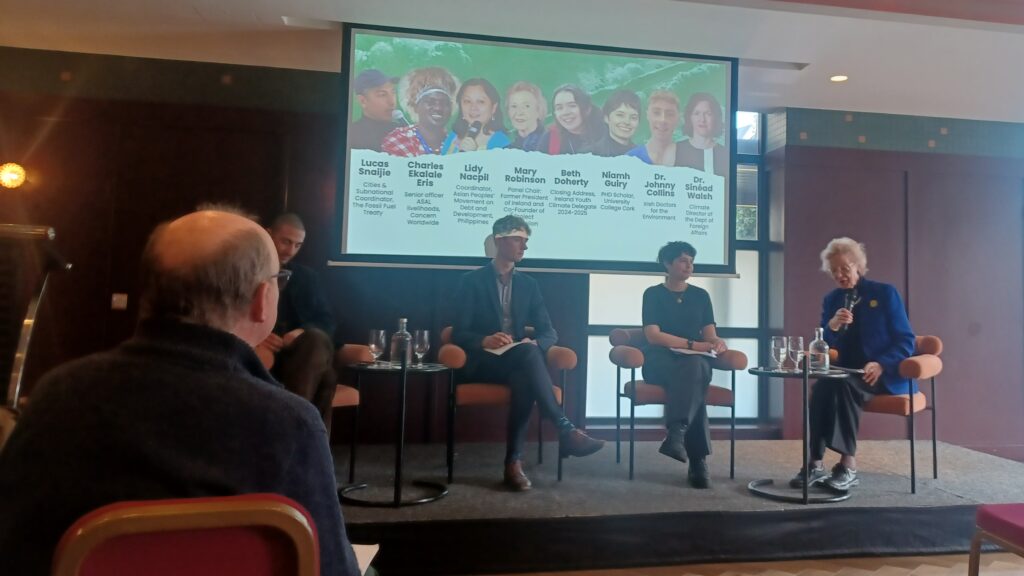
Photo caption: Mary Robinson chairing a panel discussion on How Climate Action Can Accelerate the SDGs, hosted by the Fossil Fuel Non-Proliferation Treaty Network.
While I often leave these events acutely aware of how much more I have to learn, that feeling is usually outweighed by the energy and hope I drew from the imagination, expertise, and determination of the people I meet. Knowing that there are so many people and organisations dedicated to improving lives, especially those of the most marginalised and vulnerable, gives much-needed consolation at this troubling and unstable time in our world’s history.
In various ways, the events have also reminded me of how important it is to pause and reflect. The colonialism and extractivism training course included time for outdoor reflection and walks in the stunning landscape of north Sligo. The DCU conference featured a choral performance and a poetry reading, illustrating how the arts can reach and move us in a way that facts and figures can’t. And at a time when our attention is constantly being corroded by digital technologies and our public spaces prioritise the fast movement of fossil-fuel burning vehicles, joining a group to move at walking pace and learn something together about the place where we live seems like a quietly rebellious act.
Aware of the irony of using digital technology to publish and circulate these ideas, nonetheless I remind myself, and encourage you, to remember to put down the phone or laptop and go outside if you can. Replace some screen time with ‘green time’. Try paying attention to the plants and animals around you. Even in the greyest areas there are usually some hardy wildflowers growing between the cracks in the pavements. And if you pause for a moment to look at them, you’ll likely see some insects too. You can even try learning their names.

